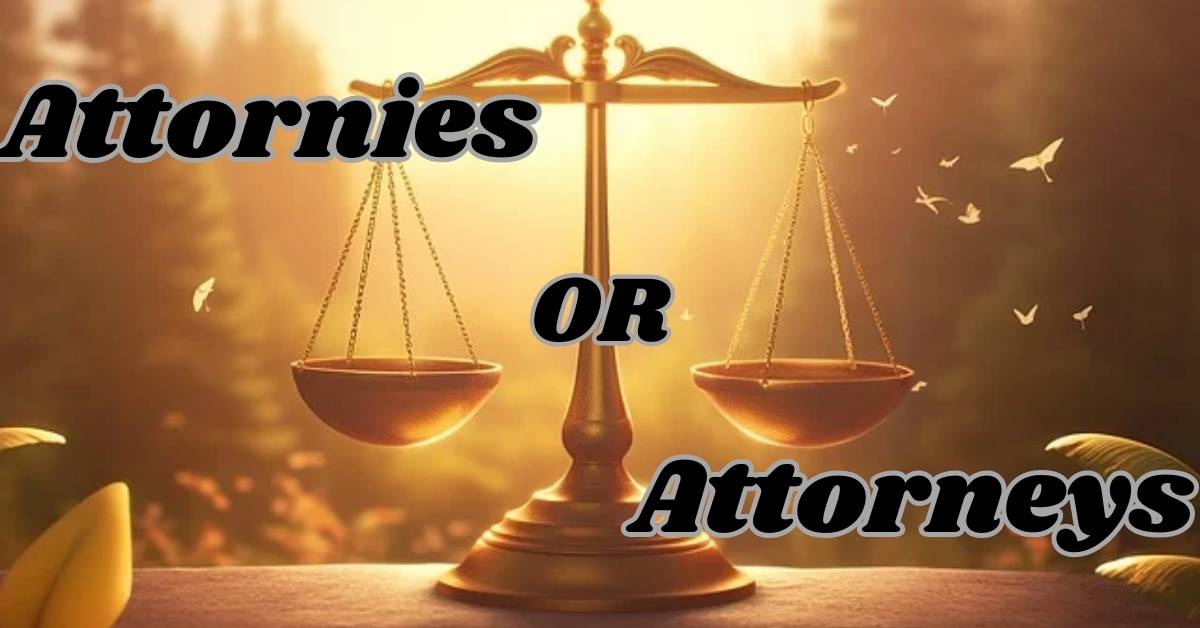Attornies or Attorneys can often confuse those unfamiliar with legal terminology. While both terms might sound similar, only one is correct in modern English.
Understanding the difference is crucial for anyone involved in legal matters, whether you’re drafting documents, seeking legal advice, or simply communicating about the law. Using the right term not only reflects professionalism but also ensures clarity in legal contexts.
In this article, we will explore the origins and meanings of these terms, clarify their usage, and provide examples to help you avoid common mistakes. By the end, you’ll feel confident using attorneys correctly in all your legal discussions.
Quick Summary
The distinction between attornies vs attorneys is straightforward: only attorneys is the correct spelling used to refer to legal professionals. This article clarifies the confusion surrounding these terms, exploring their origins, definitions, and proper usage.
Understanding this difference is essential for effective communication in legal contexts, ensuring that you maintain professionalism and accuracy in all your legal writing and discussions.
Difference Between Attornies vs Attorneys?
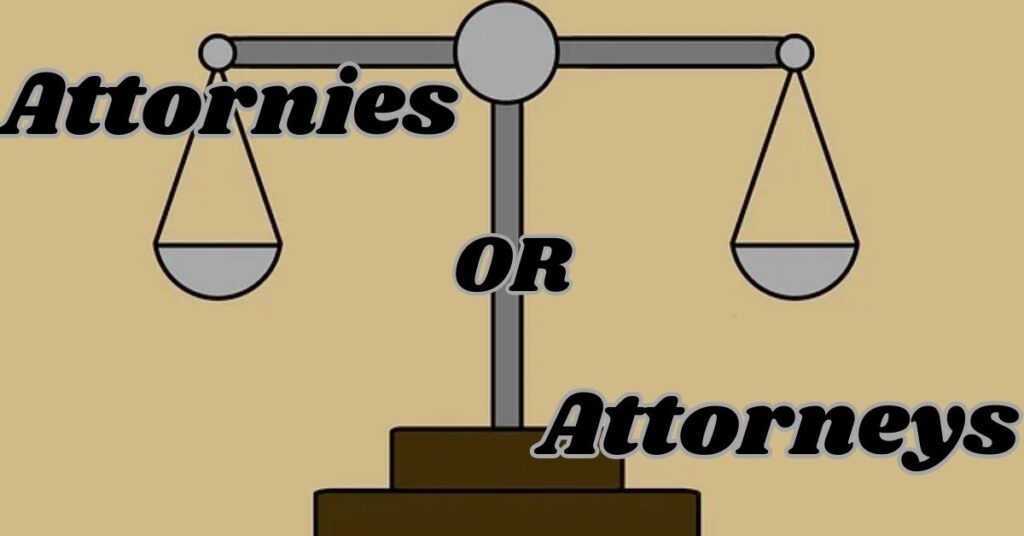
The primary difference between attornies and attorneys lies in their correctness. Attorneys is the proper term used to refer to legal professionals who provide advice and representation in legal matters.
On the other hand, attornies is simply an incorrect spelling that has no formal recognition in modern English. This confusion can lead to misunderstandings, especially in professional writing where precision is essential.
Attornies or Attorneys? It’s All Clear!
Many people might wonder why this confusion exists at all. The term “attorney” comes from the Old French word “atorner,” which means to appoint or designate. Over time, this term evolved into its modern form.
In contrast, “attornies” may appear more familiar due to its similarity to other plural forms in English. However, it is essential to remember that using attorneys is not just a matter of preference; it is a matter of accuracy in legal terminology.
Origins of the Attorneys
The term attorneys has its origins in the medieval legal system of England, particularly during the reign of King Edward I in the late 1200s. This period marked a significant development in the legal profession, as attorneys became recognized as distinct legal practitioners responsible for preparing cases and representing clients in court.
Initially, they handled paperwork and preliminary legal tasks, while serjeants focused on courtroom arguments. Over time, the roles evolved, allowing attorneys to represent clients directly in some jurisdictions, leading to the modern concept of a lawyer who manages all aspects of a legal case.
Attornies: Definition and Usage
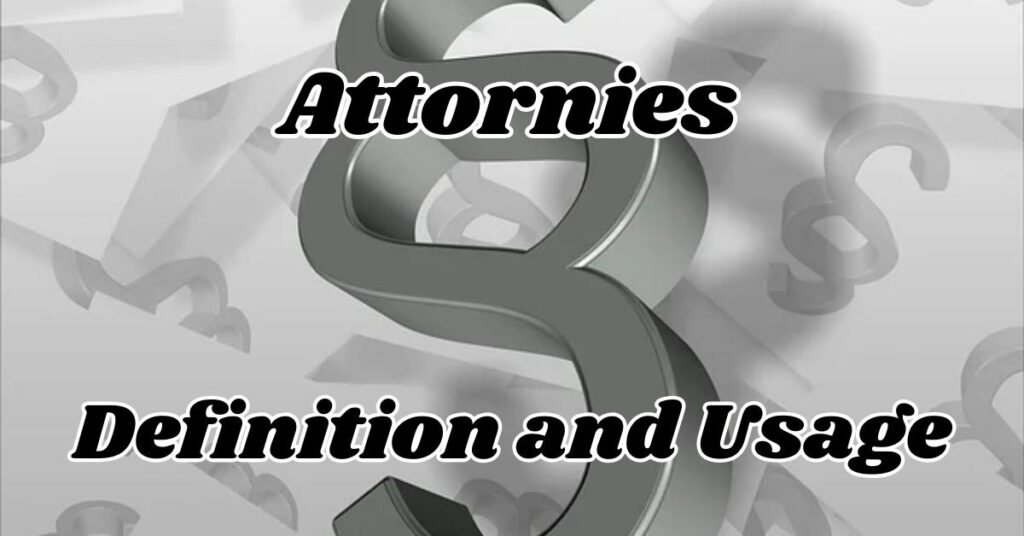
Attornies is a misspelling of the correct term attorneys, which refers to legal professionals qualified to provide legal advice and represent clients in court. Attorneys handle various tasks, including drafting documents, negotiating settlements, and advocating for clients during trials.
Using the term attornies can lead to confusion and miscommunication, especially in professional writing where clarity is essential. Therefore, it is important to use attorneys to maintain professionalism in legal contexts.
Attornies Meanings
While some may attempt to assign meanings to attornies, it is crucial to note that this term lacks formal recognition in legal vocabulary. The correct term, attorneys, encompasses those who are licensed to practice law and represent clients in various legal matters.
Misusing attornies not only reflects a spelling error but also detracts from the credibility of the writer. Understanding these distinctions ensures effective communication within the legal field.
Uses of Attornies in a Sentence
To illustrate how this misspelling might appear in everyday language:
- Many people mistakenly think that attornies are the same as attorneys.
- The attornies at the law firm were very helpful during my case.
- I need to consult with my attornies before making any decisions.
- Attornies often work long hours on complex cases.
- It’s important to choose experienced attornies for your legal needs.
These examples highlight how using attornies can lead to confusion and miscommunication.
Attorneys: Definition and Usage
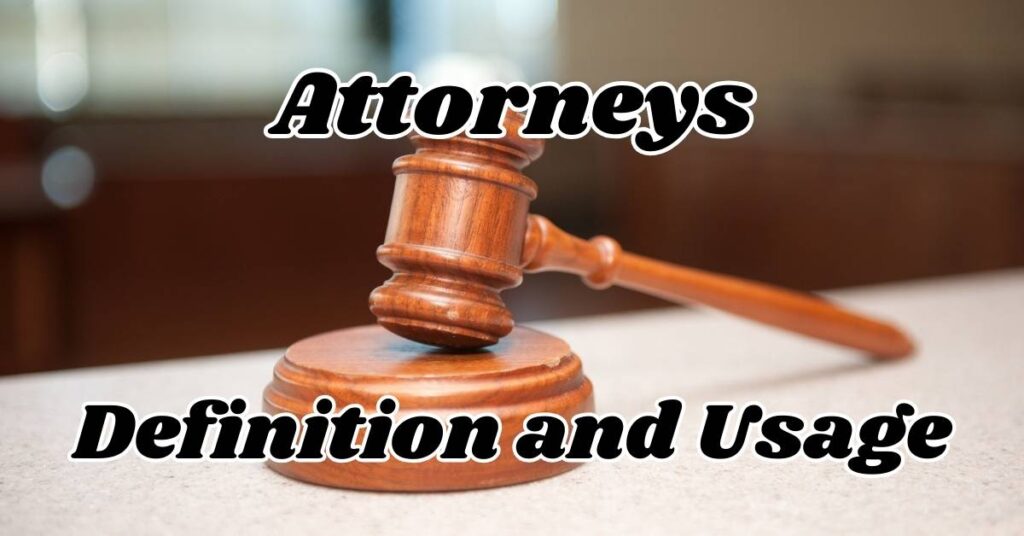
Attorneys are licensed legal professionals qualified to provide legal advice, draft documents, and represent clients in court. They play a vital role in the legal system, handling various tasks such as negotiating settlements and advocating for clients during trials.
The term “attorney” is often used interchangeably with “lawyer,” but it specifically refers to those who have passed the bar exam and are authorized to practice law in their jurisdiction.
Attorneys Meanings
The meaning of attorneys encompasses individuals trained in the law who can act on behalf of others in legal matters. This includes representing clients in both civil and criminal cases.
In addition to courtroom representation, attorneys also assist with legal research, document preparation, and providing counsel on legal rights and obligations. Their expertise is essential for navigating complex legal processes effectively.
What Are the Duties of Attorneys?
Attorneys have several critical duties that include:
- Providing legal advice on various matters.
- Representing clients in court.
- Drafting legal documents like contracts and wills.
- Negotiating settlements on behalf of clients.
- Researching relevant laws and regulations.
These responsibilities underscore their importance in navigating complex legal processes.
Uses of Attorneys in a Sentence
Here are examples demonstrating correct usage:
- My attorney advised me on how to proceed with my case.
- Attorneys play a vital role in ensuring justice is served.
- She decided to hire attorneys specializing in family law.
- The attorneys worked tirelessly to prepare for the trial.
- Many attorneys offer free consultations for new clients.
These sentences illustrate how using attorneys enhances clarity and professionalism.
Synonyms of Attorneys
Similar to before, here are synonyms for attorneys, which emphasize their roles:
- Lawyers
- Counselors
- Advocates
- Barristers
- Legal representatives
- Solicitors
- Legal experts
- Legal advisors
- Defense attorneys
- Corporate lawyers
Each synonym highlights different aspects of what attorneys do but maintains their core function as legal professionals.
Side by Side Comparison
| Aspect | Attornies | Attorneys |
| Correctness | Incorrect | Correct |
| Usage | Misspelling | Standard legal term |
| Recognition | Not recognized | Widely used |
This table clearly illustrates the differences between these two terms, reinforcing why accuracy matters.
Everyday Usage Examples
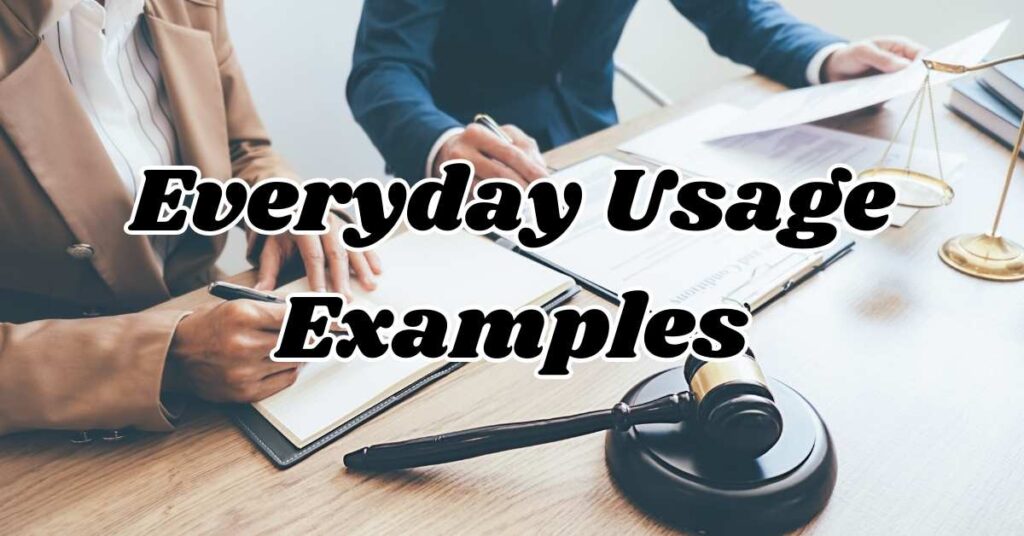
In everyday conversation or writing, using attorneys correctly can prevent misunderstandings about one’s qualifications or roles within legal contexts.
For instance, when discussing a court case with friends or colleagues, saying “I consulted my attorney” conveys professionalism and clarity compared to saying “I consulted my attornies,” which could confuse listeners about your expertise.
Attornies Example in Context
Imagine a client discussing their recent experience with a law firm: “I met with my attornies last week to discuss my case.” This statement illustrates how using the misspelled term attornies can create confusion about the speaker’s qualifications.
Instead of conveying professionalism, it raises questions about their understanding of legal terminology, highlighting the importance of accurate spelling in all legal discussions.
Attorneys Example in Context
In contrast, consider this scenario: “My attorneys provided invaluable support during my trial.” This sentence communicates that the speaker is referring to qualified legal professionals who represent clients in court.
Using attorneys not only enhances clarity but also reflects a proper understanding of legal terms, reinforcing the speaker’s credibility and professionalism in discussing serious legal matters.
Tips to Avoid Mistakes

To prevent confusion between these terms:
- Always double-check your spelling when writing about legal matters.
- Familiarize yourself with common legal vocabulary.
- Use grammar tools like spell checkers for assistance.
- Read through documents carefully before finalizing them.
- If unsure about terminology, consult a reliable source or professional.
By following these tips, you can enhance your writing clarity and avoid common mistakes associated with spelling errors.
More Article: Societies or Society’s: Which One is Correct?
FAQs: Attornies or Attorneys
What is the plural for attorney?
The plural of attorney is attorneys.
How to make attorney-at-law plural?
The plural form of attorney-at-law is attorneys-at-law.
Is it spelled attornies or attorneys?
The correct spelling is attorneys, while attornies is a common misspelling.
Can a person have two power of attorneys?
Yes, a person can designate multiple individuals as power of attorneys, each with specific responsibilities.
Why do people mix up “attornies or attorneys”?
People often confuse attornies and attorneys due to phonetic similarity and misunderstandings about English spelling rules.
Conclusion
Understanding the difference between attornies or attorneys is essential for effective communication in legal contexts. The correct term, attorneys, refers to licensed professionals who provide legal representation and advice.
Misusing attornies can lead to confusion and undermine credibility in professional writing. By being mindful of spelling and terminology, you not only enhance your professionalism but also ensure clarity in discussions about legal matters. Always strive for accuracy to navigate the complexities of the legal field confidently.
Related Post: Purposed vs Proposed: What’s the Difference?

